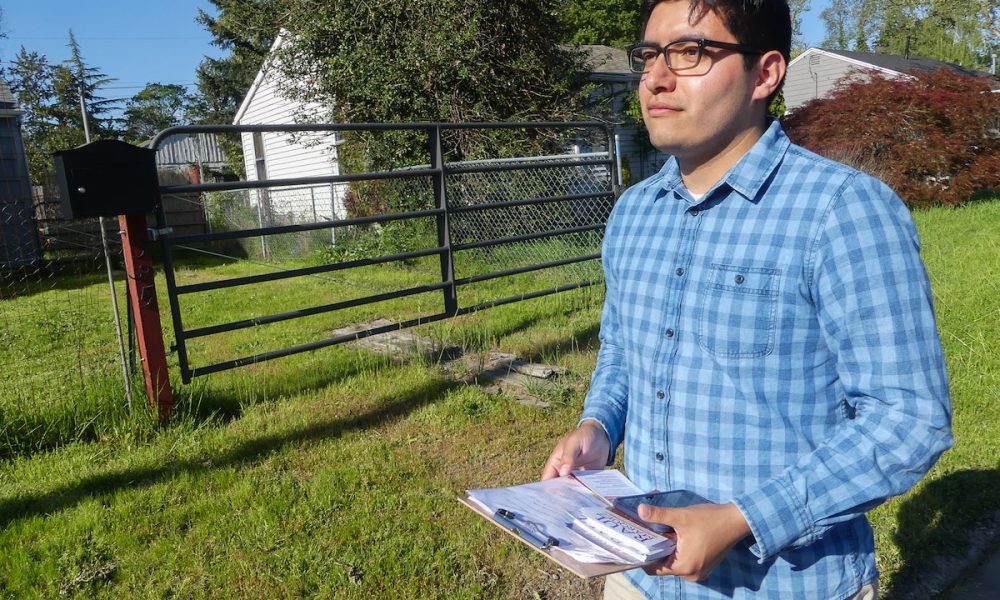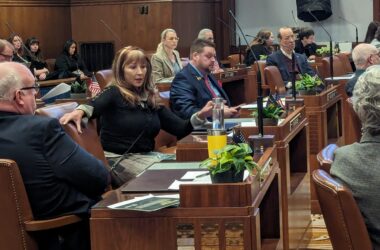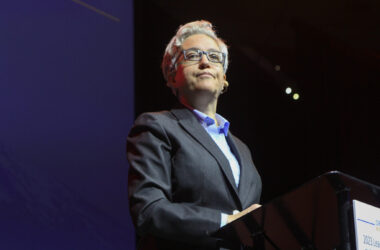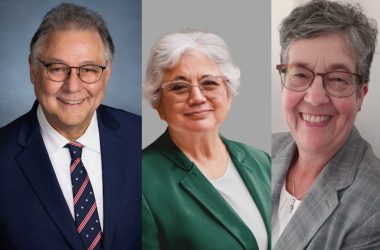 Miguel Barrientos, a paid field organizer for Pineros y Campesinos Unidos del Noroeste, walks door-to-door in southeast Salem, canvassing for school board candidates Raul Marquez and David Salinas. (Rachel Alexander/Salem Reporter)
Miguel Barrientos, a paid field organizer for Pineros y Campesinos Unidos del Noroeste, walks door-to-door in southeast Salem, canvassing for school board candidates Raul Marquez and David Salinas. (Rachel Alexander/Salem Reporter)
Miguel Barrientos wore a button-down shirt and sneakers as he walked along Townsend Way in southeast Salem on a recent Wednesday afternoon.
He’s spent nearly every afternoon since mid-February knocking on doors, avoiding barking dogs and switching fluidly between English and Spanish as he talks to registered voters, many of them Latino.
The recent Portland State University graduate said he wanted to come back to his home community get involved.
“I was working as a letter carrier, so I was already going door to door,” he said.
Barrientos is one of five paid field organizers for Oregon’s farm worker union, Pineros y Campesinos Unidos del Noroeste, which has become a growing political force in local elections.
The group is now pursuing a goal that eluded organizers in 2017: elect the first Latino member of the Salem-Keizer School Board, which oversees a district serving a 40% Latino student body.
“It’s been a lot of our dreams to see someone who really reflects the community,” said Reyna Lopez, PCUN’s executive director.
To do that, the organization has spent more than $13,000 on in-kind support for two candidates: Raul Marquez and David Salinas, including having field manager Enrique Ruiz run both campaigns.
Paid organizers like Barrientos are out every weekday knocking on doors, while volunteers from PCUN, Marion County Democrats, other local unions and Progressive Salem members join in canvassing on Saturdays.
Their goal is to knock on 20,000 doors before the May 21 election.
READ: Salem Reporter’s coverage of all six school board candidates
 Enrique Ruiz, PCUN field manager, talks to volunteer Jon Steiner, a retired McNary High School teacher, during a canvassing training on April 27, 2019 in Salem (Rachel Alexander/Salem Reporter)
Enrique Ruiz, PCUN field manager, talks to volunteer Jon Steiner, a retired McNary High School teacher, during a canvassing training on April 27, 2019 in Salem (Rachel Alexander/Salem Reporter)
It’s an effort their opponents have been challenged to match. Marquez has raised and spent more than incumbent Marty Heyen, who said she’s focused her campaign on attending community events, and had to balance it with her work on the board, which is currently reviewing a proposed budget for next school year.
Satya Chandragiri, who’s running for an open seat against Salinas, said he’s walked door-to-door to talk to people and reached out to leaders in immigrant communities individually, including Salem’s Sikh temple. But his canvassing efforts have been largely him and a handful of supporters, he said.
Samuel Davila, an organizer for Service Employees International Union Local 503 in Salem who’s been helping with the Marquez and Salinas campaigns, said the need for Latino representation has been clear to him for decades.
In the mid-1990s, Davila was the director of Mano a Mano when the school district started using a “gang intervention manual” detailing images and slang that supposedly were used by gang members.
Davila at the time went before an all-white school board to explain that many of the items in the manual, including images of the Virgen de Guadalupe and slang terms like “órale!” (a broad expression often used as encouragement or agreement) were common aspects of Mexican and Mexican-American culture that had nothing to do with gangs.
It’s something a Latino member of the board would have known immediately, he said.
“That was my first experience with the Salem-Keizer School Board,” he said.

School board candidate David Salinas talks to volunteers during a canvassing training on April 27, 2019 at SEIU 503 headquarters. (Rachel Alexander/Salem Reporter)
PCUN has taken an active role in local politics for several years, seeking both to elect Latino candidates and engage Latino voters, who Lopez said are often overlooked in campaigns.
“In order to live in a healthy democracy where people participate, we need to make sure we talk to the people who are most ignored,” Lopez said.
The group knocked on doors in 2016 for Teresa Alonso Leon’s successful campaign in House District 22 and led a push in 2017 to elect a majority Latino board in the Woodburn School District, where four in five students are Latino.
The group also campaigned for the Salem-Keizer School District’s $620 million bond measure last year, which will renovate or expand nearly every school in the district over the next five years.
“I don’t think we would have passed our bond without PCUN helping us,” said Jim Green, a Salem-Keizer school board member.
But the work in 2017 to elect Mano a Mano director Levi Herrera-Lopez to a school board seat failed. Herrera-Lopez, who focused on canvassing among Latino voters in northeast Salem, lost the race to Jesse Lippold.
Herrera-Lopez raised about $13,000 to Lippold’s $10,000, campaign finance records show, with the bulk of his support through in-kind contributions from PCUN. Lippold’s campaign was mostly backed by Oregon Right-to-Life, which sent out mailings on his behalf.
Herrera-Lopez said many people he talked to while canvassing didn’t know there was an election.
“A lot of them didn’t know they were registered,” he said. The day before election day, he found some voters had filled in but not mailed their ballots.
Lopez said that campaign was a learning opportunity and has informed how the group approaches this year’s election.
“We made some mistakes and I think we did some things really well,” she said. “We did what we did best which was turn out volunteers and make sure that there was a people power.”

Raul Marquez, school board candidate, talks to volunteers during a canvassing training on April 27, 2019 at SEIU 503 headquarters. (Rachel Alexander/Salem Reporter)
Herrera-Lopez, who now serves as chair of the district’s budget committee, said that campaign also showed him how Latino candidates can get reduced to just their race.
He downplayed his ethnic background during the campaign, choosing instead to focus on his experience as a local nonprofit leader who knew the community. But among supporters and detractors, some saw him only as “the Latino candidate.”
“It made me wonder – is that the only reason you’re voting for me?” he said. “I don’t want to be elected because of my skin color.”
It can be a difficult line for candidates to walk: acknowledging that a significant portion of Salem-Keizer students and families have no one who looks like them on the board, but also making sure voters understand the other experience they bring to the table.
“We’re not just backing them up because they’re Latinos,” Lopez said of Marquez and Salinas. “We came out for them because they’re very aligned with our vision and our values.”
PCUN has also endorsed Chuck Lee in the third school board race, though it’s not actively campaigning for him.
Barrientos and other organizers emphasize different parts of each candidate’s story depending on who they’re talking to. His spiel begins by noting that Marquez and Salinas are from this community: Salinas has four children in the district, and Marquez graduated from McKay High School last year and raised money for a youth homeless shelter.
With younger voters, Barrientos talks more about Marquez. For Latino voters, he emphasizes that both men come from farm families.
Lopez said she’s hopeful PCUN can leverage its stepped-up effort this year into a win.
It’s a personal issue for her. Lopez attended Hoover Elementary School and Waldo Middle School before graduating from McKay. She said McKay was often looked down on by other high schools in the district because most students were from working-class families.
She never saw anyone who looked like her in district leadership. And the district is still lacking equity for students, as evidenced by the low graduation rates for Latino and other students of color, she said.
“Salem-Keizer can do better and I have a lot of faith that these two are going to make it happen,” she said.
Reporter Rachel Alexander: [email protected] or 503-575-1241.
Follow Salem Reporter on FACEBOOK and on TWITTER.
YOUR SUBSCRIPTION WOULD HELP — Salem Reporter relies almost exclusively on reader subscriptions to fund its operations. For $10 a month, you hire our entire news team to work for you all month digging out the news of Salem and state government. You get breaking news alerts, emailed newsletters and around-the-clock access to our stories. We depend on subscribers to pay for in-depth, accurate news. Help us grow and get better with your subscription. Sign up HERE.

Rachel Alexander is Salem Reporter’s managing editor. She joined Salem Reporter when it was founded in 2018 and covers city news, education, nonprofits and a little bit of everything else. She’s been a journalist in Oregon and Washington for a decade. Outside of work, she’s a skater and board member with Salem’s Cherry City Roller Derby and can often be found with her nose buried in a book.









